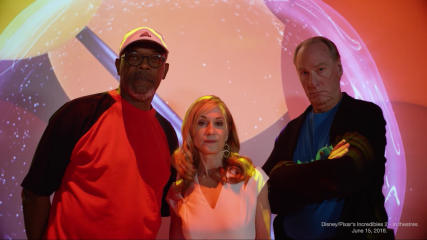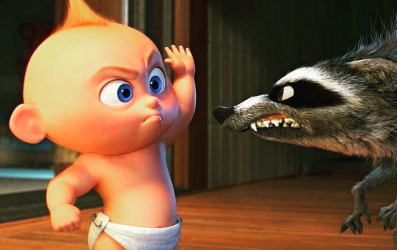It is hard to over-estimate how greatly Pixar has fallen at The House of Gique. We view them as having produced the longest streak of perfect (or near-perfect) films in movie history: eleven. From Toy Story to Toy Story 3, coming to a crashing halt with the dismal Cars 2, and sputtering back to life briefly with Brave, Monsters University, and Inside Out. The Flower, who was young enough for me to refer to as “The Flower” when I started blogging ten years ago, and who got excited to see the little white lamp jump out on a preview, now has to be coaxed into seeing anything the studio puts out. We all saw Coco, and we all agreed it was very good, but we also all agreed it wasn’t Pixar. It was straight-up Disney. (This is not strictly a quality matter. We also all agreed that Zootopia was very good, and rather more Pixar-y.)
The Boy and I were in the part of town where we usually will try to pack in two Korean or Chinese movies (’cause it’s a bit of a drive), and while we had settled on the (rather glorious) Chinese film Animal World—a movie about the high stakes world of underground Rock, Scissors, Paper—we were short a first feature. We go see a lot of movies, but have found very little mainstream stuff appealing lately, and we both sorta wanted to see this. And we both had the same reaction to it.
Meh.
First of all, they did the same thing they did with Coco (and maybe this started with Wreck-It Ralph) where some people who made the film (actors, in this case) come out before the movie to tell you how much you’re going to like the movie that you paid for and are waiting to see. It feels positively needy.
Second of all, they’re all 15 years older and it really, really shows. I don’t know if Holly Hunter smokes, but her voice has gone from a charming whiskey-soaked Southern twang to your grandmother. Craig T. Nelson is no spring chicken either. Neither of them did “voices” for this, and that’s the price you pay. (Frank Welker can still sound like Freddie Jones of Scooby-Doo from 50 years ago, by contrast.) Writer/director Brad Bird’s Edna Mode is fine. And this may not bug most people, but I sorely felt the absence of the late Bud Luckey (who plays agent Rick Dickey, the guy in charge in keeping Mr. Incredible employed).

“Old”
Third of all, SJWness (social justice warriors abound!). The Boy didn’t think it was so bad, but as I pointed out the examples, he began to see it, too. To elaborate it helps to get a light summary of the story:
We begin at the exact end of the previous movie with the Underminer running amok and our newly united super family ready to face him together! Except this is a new movie and we need a new conflict, so let’s pretend nothing was resolved by the last movie—the number one ways sequel screw up their classic origins—and let’s use the same conflict again, to wit, the Parrs are at each others’ throats and (despite saving the day) superheroes are still illegal. The Incredibles save the day from the Underminer, but this backfires due to collateral damage. (People are arguing that they didn’t save the day, but they stop his drill from smashing into City Hall or whatever, so even though he gets away with the cash, I’d say it still counts.)
Now the Parrs are broke because the government can’t get them jobs any more. A reprieve comes in the form of a Jobs/Wosniak-style brother-sister team who assure the Parrs that, if only they wear body cams so people can see what they prevented from happening rather than just the after-damage. They can use this to sway public opinion and get supers de-criminalized. Because Mr. Incredible tends toward the more destructive, Elastigirl will be the pilot, and her target is the mind-controlling Screenslaver. Bob will stay home and take care of Jack-Jack.
The Mr. Mom bit was reasonably fresh when Michael Keaton did it in 1983, and it doesn’t have to be the case that this kind of storyline is SJW, but the Bob Parr of this movie is more than just a middle-aged man looking to relive his glory days: He’s freaking psychotic, usually on the verge of a murderous rage. When his wife tells him how good the crime-fighting is going, he’s so riddled with envy, he has to fight his urges in order to congratulate her (even though her success means the realization of his goals).

Mr. Incredible in one of his happier moments.
He’s completely unable to do the house-husband thing at first. Just when I was about to check out, he has a good moment and I think, “OK, at least they’re not going to turn him into a complete boob.” Except that the next scene, he’s back to being completely overwhelmed. It doesn’t help that Elastigirl’s (already over-played) feistiness gets knocked into 12th gear here. She seems utterly unsympathetic to Bob, with only a token nod toward missing the biggest moments of her baby’s life.
The thing is, once you notice one of these things, they start to pile up fast. In the brother-sister team, for example, it’s the sister who’s the world-wise Wozniak (technical wizard), and the brother who’s the bubble-headed Jobs. The sensible Violet is victimized by her father’s blundering attempts to help, while Dash is basically random destructiveness.
Then you got the second string heroes. Remember in the first movie, there’s a quick run-through of all the (murdered) super-heroes? You probably didn’t think anything of it, but all those characters were what you might call “conventionally attractive” and “rather idealized”. In this movie, all of the heroes (apart from the Parrs and Frozone) are what Diversity & Comics would call alt-lifestyle-freakazoids, except for the one white male who’s old and has irritable bowel syndromeacid reflux for his power. I mean, the most prominent one even sports the classic “mentally disturbed” hairstyle, blue and shaved on one side.

Who WOULDN’T want to look like these guys.
They look like the latex version of a furry convention.
Bird, whom I have loved since his early days on the “Simpsons” and “The Critic” (which series also boasted Zootopia’s director Rich Moore), was wrong to bristle at the Twitter dad who said his kid had trouble sitting still during the talky parts. There are two lengthy, pointless speeches that I think a more engaged John Lasseter would’ve gently guided Bird away from. At 2:05, it’s too long for woke, girl-power speeches which literally do nothing to advance the plot.
All this I could, believe it or not, overlook but the story is as by-the-numbers as they come. The villain is supposed to be a surprise, but it’s tipped very early on, and the only way around it would be for the story to have lied to us (a la Frozen). Elastigirl misses so many obvious cues—mind control is about as hoary a superhero cliché as they come—she ends up looking a little dumb. But I have a theory about that.

Everybody looks fine in here!
I have mentioned many times that I think critics come out with a gut-reaction to a movie, like everyone else, and then backfill it with “reasons”, much like people do with politics. But with SJW-based fiction (not exclusively, but especially), we see artists desiring to see specific outcomes played out by certain demographics, and the stories are completely retrofitted to make those things happen however little sense it makes. This happens big and small throughout, as when Violet’s character arc shows her accepting the possibility that a teenage girl might occasionally, maybe, sometimes when there’s no other option, be suited to babysitting.
Our expectations were low, but we were still pretty disappointed. As I mentioned, The Boy hadn’t initially considered it too SJW, and he still gave it a “meh”.
The short up-front is very cute, by the way, about a little Chinese dumpling that comes to life and acts out life from babyhood to young adulthood with the middle-aged woman who made it. When the obvious climax occurs, people in our theater were shocked, and even a little upset. Because a story about a walking dumpling is of course completely literal.
And Animal World was the bomb, yo.

The average audience member vs. me with regard to this movie.

Meh is being nice.
The only scene where I (or my wife or daughter) laughed is the one in the photo at the end of your post.
Jack Jack vs. the Raccoon was very funny.
Right? I got a lotta pushback on this but what a drag!